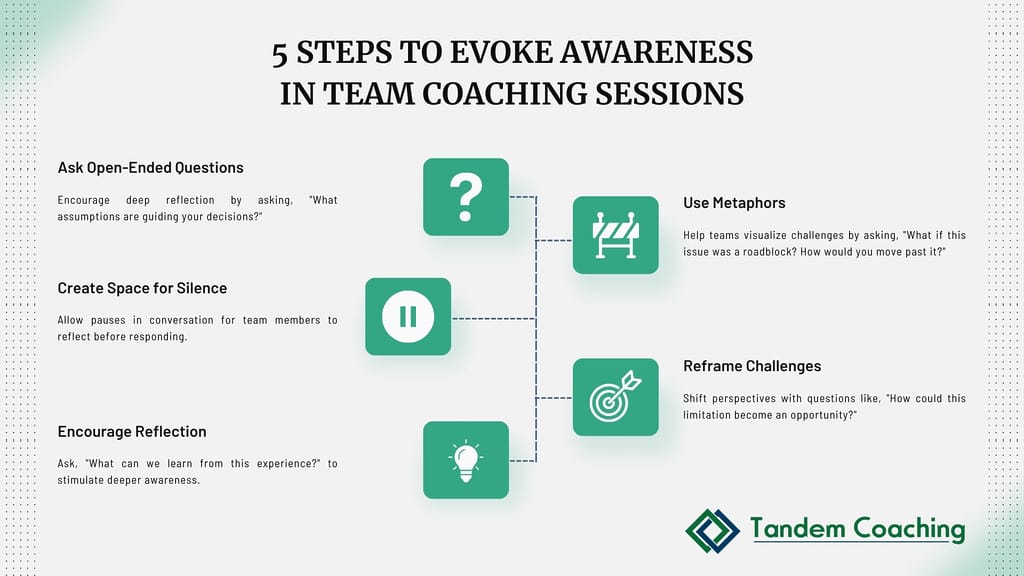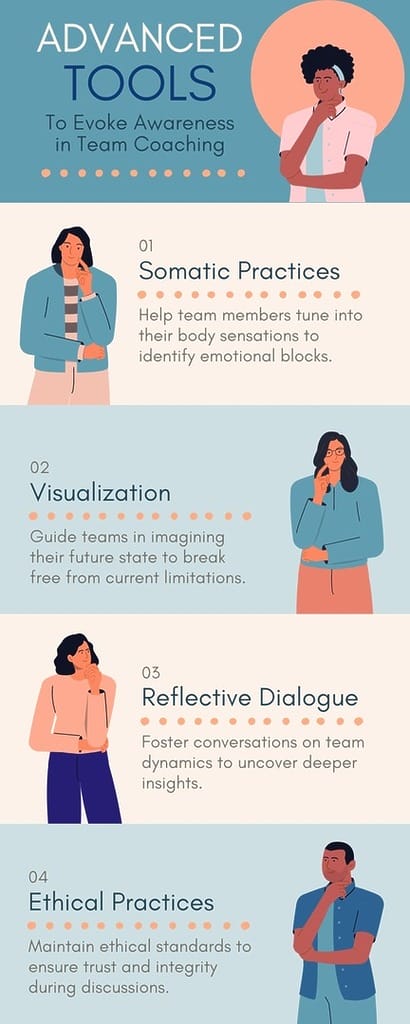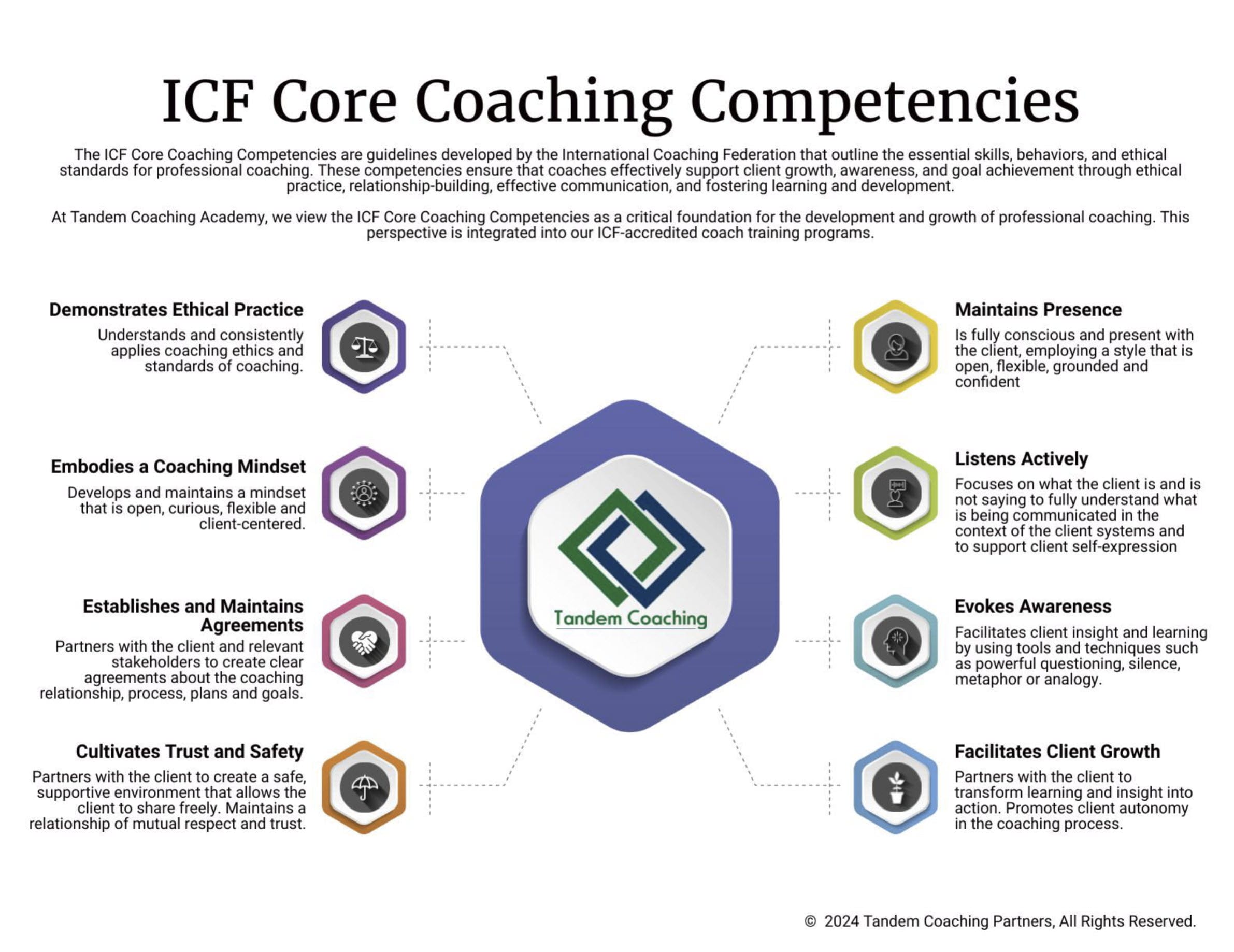Coaching professionals often seek ways to enhance their impact, especially when working with teams. One of the most transformative tools available to coaches is the ability to evoke awareness. Evoking awareness involves guiding clients to new insights about themselves, their behaviors, and their interactions with others. It’s one of the most vital competencies defined by the International Coaching Federation (ICF) and is a cornerstone of effective team coaching.
In this article, we’ll explore the techniques and strategies that enable coaches to evoke awareness within team dynamics. Whether you’re an experienced coach or someone considering ICF team coaching competencies for professional coaches, understanding how to evoke awareness can significantly improve your sessions. We will cover practical methods like powerful questioning, metaphors, and silence. We’ll also delve into real-world examples of how these techniques can foster breakthroughs in team coaching. By mastering these tools, you’ll be better equipped to facilitate deep, transformative change in your clients, setting your coaching apart and helping teams reach their full potential.
Ready to enhance your coaching skills? Let’s dive into the world of evoking awareness and discover how it can unlock new possibilities for your clients and teams alike.

What You’ll Learn: Mastering Team Coaching through Evoking Awareness
- How to Evoke Awareness in Teams: Learn the techniques of powerful questioning, metaphors, and silence to foster deeper insights and collaboration.
- Overcoming Team Coaching Challenges: Discover strategies to address resistance, dysfunction, and conflict within teams.
- Mastering ICF Competencies: Understand how ICF certification enhances your ability to evoke awareness, ensuring ethical and professional coaching practices.
- Advanced Coaching Techniques: Explore somatic practices, visualization, and reflective dialogue to help teams reach new levels of awareness and performance.
- Reframing Perspectives for Breakthroughs: Learn to guide teams in shifting their mindset from obstacles to opportunities, unlocking new possibilities.
- Aligning Team Beliefs and Values: Help teams clarify and align their individual and collective values, creating a strong foundation for growth.
- The Long-Term Impact of Awareness: Discover how ongoing awareness-building transforms teams, fostering adaptability and long-term success.
How to Evoke Awareness in ICF Team Coaching Sessions
When coaching teams, the process of evoking awareness becomes both more complex and rewarding. Unlike individual coaching, you are dealing with a group of people who each bring unique perspectives, challenges, and motivations. To foster collective growth, coaches need to apply specialized techniques that encourage teams to uncover deeper insights.
One of the most effective methods for evoking awareness in team settings is through powerful questioning. Open-ended questions allow team members to reflect on their experiences, values, and beliefs, encouraging them to look beyond surface-level thinking. Questions like “What patterns do you see emerging in your team’s behavior?” or “How might your current approach be limiting the team’s potential?” can unlock new perspectives and solutions.
Another powerful tool is the use of metaphors. For example, a team might describe their project as a “ship in stormy seas.” As the coach, you can guide them to explore this metaphor further: What are the “waves” disrupting the team? How can they “steady the ship” together? This kind of inquiry helps the team connect emotionally to their situation, often leading to creative breakthroughs.
Finally, silence is a powerful yet underutilized tool in team coaching. Holding space for reflection without immediately filling the void with more questions or suggestions allows team members to process their thoughts, leading to deeper insights.

Best Practices for Evoking Awareness in ICF Team Coaching
Evoking awareness requires more than just asking questions—it’s about understanding the underlying values, beliefs, and motivations that drive team behavior. For coaches working with teams, mastering this competency involves integrating several practices into your sessions.
One best practice is to understand the team’s beliefs and values. Ask probing questions like, “What does success look like for this team?” or “What values are guiding your decisions?” By helping teams clarify their shared beliefs, coaches can evoke a stronger sense of collective purpose and direction.
In addition to beliefs, it’s crucial to address the individual motivations within the group. Teams are made up of individuals, and each person may have different drivers. By acknowledging these differences and guiding the team through reframing perspectives, coaches can bring out previously unspoken concerns or aspirations that may be holding the team back.
Asking open-ended questions like “What are we not seeing?” or “How can we align better with each other’s strengths?” can help teams challenge their assumptions and discover new possibilities for growth.
“Evoking awareness isn’t just about offering insights; it’s about creating a space where the team can generate its own understanding.” — Psychology Today: How Can Coaches Evoke Awareness?
Incorporating these best practices into your coaching sessions will not only help teams gain clarity but will also foster an environment of collaboration and innovation.
Practical Examples of Evoking Awareness in Team Coaching
One of the best ways to understand how to evoke awareness in ICF team coaching is through real-world examples. Let’s explore a couple of scenarios where evoking awareness helped transform a team’s dynamics.In one team coaching session, a group of executives felt stuck in their decision-making process. They had been discussing the same problem for weeks without reaching a conclusion. The coach decided to evoke awareness by asking a powerful, open-ended question: “What assumptions are you making that are preventing you from moving forward?” This question encouraged the team to reflect on their thought processes. One executive realized that they were assuming their marketing department lacked the skills needed for the task. Once this assumption was challenged, the team came up with a new strategy that involved additional training for the marketing team rather than outsourcing the work.Another example involved a team using the metaphor of a “broken bridge” to describe their current workflow. The coach used this metaphor to evoke awareness by asking, “What would it take to repair the bridge?” This simple question led the team to identify specific areas where communication and collaboration had broken down. By addressing these areas, the team rebuilt trust and became more cohesive in their operations.“Metaphors can powerfully evoke awareness, helping teams visualize and articulate challenges they may not be able to express directly.”These practical examples highlight how using questioning and metaphors can lead to breakthroughs in team coaching sessions.
Mastering ICF Competency: Evoking Awareness for Team Coaches
For team coaches, mastering the art of evoking awareness for team dynamics in coaching is crucial to creating lasting change. But what does it take to truly master this ICF competency?First, coaches must learn how to apply the ICF PCC competencies in team coaching. This involves using specific tools, like silence and reframing, to help teams unlock new insights. As a team coach, you might notice subtle patterns in how team members interact. By sharing these observations in a non-judgmental way, you can encourage the team to reflect on their behavior. For example, a coach might say, “I notice that when we discuss certain topics, there seems to be a lot of hesitation. What’s behind that hesitation?” This type of inquiry helps the team become more self-aware and can lead to significant breakthroughs.Another key aspect of mastering this competency is understanding how to challenge a team’s beliefs and assumptions. When a team believes they are doing everything possible to solve a problem, the coach’s role is to push them beyond their current thinking. Questions like, “What would happen if you approached this problem from a completely different angle?” or “How would your competitors tackle this issue?” can disrupt old patterns and lead to fresh perspectives.“Coaches who master evoking awareness don’t just ask questions; they challenge teams to explore deeper layers of their beliefs and behaviors.” — Stellar Conversations: ICF Core Competency 7Mastering this competency requires practice, patience, and a deep understanding of the tools to help evoke awareness in team coaching. By honing these skills, coaches can significantly impact the teams they work with, fostering growth and innovation.
Challenges in Evoking Awareness in Team Coaching
While evoking awareness is a powerful tool in team coaching, it comes with its own set of challenges. Teams often face roadblocks when it comes to self-reflection, which can prevent the deep insights necessary for growth. As a coach, it’s essential to recognize these obstacles and know how to navigate them effectively.One of the most common challenges is resistance to awareness. Sometimes, team members may be reluctant to confront the underlying issues within the group. This resistance can stem from fear of change, uncertainty, or discomfort with vulnerability. In these cases, the coach must work to create a safe environment where team members feel comfortable exploring their thoughts and behaviors. By using techniques like reframing perspectives in team coaching, coaches can help individuals shift their mindset and reduce resistance.Another common challenge is dealing with team dysfunction. Dysfunctional teams often struggle to communicate effectively, making it difficult for them to engage in meaningful self-awareness exercises. A coach might ask, “What assumptions are you making about each other that could be impacting your team’s performance?” Questions like this can help uncover hidden tensions or biases, allowing the team to address issues head-on and improve collaboration.Finally, it’s important to acknowledge that conflicts within teams can make it hard to evoke awareness. When conflict is present, team members may be more focused on defending their positions than on reflecting on their behaviors. A coach can guide teams through this by encouraging a shift from defensiveness to curiosity, asking, “What might we learn from this conflict that could help us grow as a team?”“Awareness emerges from exploring both individual and collective blind spots. It’s the coach’s role to facilitate this process without judgment.”Overcoming these challenges requires patience and skill, but by using the right tools and fostering a safe space for exploration, coaches can help teams break through these barriers and move toward higher performance.
Advanced Techniques for Team Coaches: Tools and Strategies
Once you’ve mastered the basics of evoking awareness, it’s time to expand your toolkit with advanced techniques. These approaches are particularly useful when working with teams that have already engaged in some level of self-reflection but need deeper exploration.
One highly effective technique is the use of somatic practices. Somatic coaching involves helping team members become more aware of their physical sensations as they process emotions and thoughts. For example, if a team member is feeling stressed or tense, a coach might ask, “Where do you feel that tension in your body?” This practice helps individuals connect their emotional state with their physical experience, which can lead to powerful insights. By incorporating somatic practices, coaches can evoke a deeper level of awareness within the team, fostering both emotional and physical alignment.
Another advanced strategy is the use of visualization techniques. In a team coaching session, coaches can guide teams through a visualization of their ideal future state. This can help teams move beyond their current challenges and see the bigger picture. For example, the coach might ask, “Imagine your team has successfully completed this project. What do you see, hear, and feel?” Visualization allows teams to step out of their immediate struggles and align their actions with their long-term goals.

“By guiding teams through somatic awareness and visualization, coaches help them access insights that go beyond intellectual understanding.”
Finally, the technique of reflection and dialogue can deepen team awareness. Encouraging teams to engage in reflective discussions about their progress, setbacks, and behaviors can uncover patterns that may not have been obvious initially. Coaches might ask, “What have we learned about our team’s dynamics over the past month?” or “How has each person contributed to the success or challenges of the group?”
By combining these advanced tools—somatic practices, visualization, and reflective dialogue—team coaches can evoke a richer, more holistic awareness that drives sustained growth and transformation.

Discover ICF PCC and ICF ACTC Team Coaching Competencies and Mastery
Are you eager to magnify the impact of your coaching practice?
Our ICF Team Competencies program offers a seamless transition for those who have mastered the core competencies, allowing you to delve deeper into the complexities and rewards of team coaching.
Explore this opportunity today.
ICF Team Coaching Certification and Evoking Awareness
Earning your ICF certification can significantly enhance your ability to evoke awareness in team coaching. The certification process ensures that coaches meet the highest professional standards, particularly when it comes to applying core competencies like evoking awareness.One key benefit of pursuing ICF certification is the opportunity to master techniques that create deeper engagement within teams. Coaches working toward the ICF PCC competencies in team coaching learn how to facilitate team dynamics that foster awareness. This includes helping teams recognize their collective goals and navigate challenges together. For instance, a coach might guide a team through a reflection exercise, asking, “What collective values are driving this team forward, and what’s holding it back?” This type of inquiry not only sharpens awareness but also aligns the team’s vision.ICF certification also emphasizes ethical considerations in team coaching. As teams explore their internal dynamics, sensitive issues can emerge, such as power imbalances or unspoken tensions. Coaches must remain vigilant about maintaining confidentiality and fostering a safe environment, as outlined in the ICF Code of Ethics. Through this, coaches can ensure that the process of evoking awareness is handled with care, allowing teams to explore their challenges openly.“The more ethical a coach is in handling team awareness, the greater the trust and transformation that can be achieved.” — ICF Team Coaching CompetenciesThe ICF certification process helps coaches not only refine their technical skills but also deepen their ethical practice, ensuring long-lasting impact in team settings.
Conclusion: The Long-Term Impact of Evoking Awareness in Team Coaching
The process of evoking awareness for team dynamics in coaching is not a one-time event; it is a long-term strategy that fosters growth, innovation, and collaboration. When teams consistently engage in self-reflection and awareness-building, they can adapt more effectively to changing circumstances and solve complex problems together.
For example, consider a team that initially struggled with communication. By engaging in regular reflection exercises and addressing their hidden assumptions, they became more aware of how each member’s behavior impacted the group. This awareness led to improved trust and collaboration, resulting in higher performance. Through continuous team coaching skills to evoke client awareness, the team was able to transform their dynamics and achieve long-term success.
Moreover, as teams develop this self-awareness, they become more resilient. They can identify and address issues early on, rather than allowing small problems to grow into major obstacles. This proactive approach fosters a culture of open communication and continuous improvement. Teams that practice awareness are also better equipped to navigate conflicts and turn them into opportunities for growth.
“Awareness is the foundation of progress. Without it, teams remain stuck in old patterns; with it, they unlock new possibilities.” — Evoking Awareness in Coaching
In conclusion, evoking awareness is a vital tool in team coaching, offering both immediate breakthroughs and long-term benefits. For coaches aiming to make a lasting impact, mastering this competency is essential.
FAQs: Evoking Awareness in ICF Team Coaching
What is evoking awareness in team coaching?
Evoking awareness in team coaching is about guiding teams to deeper insights through techniques like questioning, reframing, and metaphors. This helps teams reflect on their behavior, values, and interactions, leading to more effective collaboration and performance.
How does ICF certification help in evoking awareness?
ICF certification provides structured training on key competencies, including evoking awareness. It helps coaches master tools like open-ended questioning, team dynamics, and ethical practices to foster deeper team insights and growth.
What are the best practices for evoking awareness in teams?
The best practices include using open-ended questions, metaphors, and silence to encourage reflection. Coaches should also create a safe space for vulnerability, challenge assumptions, and help teams explore alternative perspectives.
How do I overcome resistance to awareness in a team?
Overcoming resistance involves creating a safe, trusting environment where team members feel comfortable exploring difficult topics. Using tools like reframing and questioning to gently challenge assumptions can also help reduce resistance and open up new possibilities.
What techniques help evoke client awareness in teams?
Techniques include using powerful questions, metaphors, somatic practices, and reflective dialogues. These help teams explore their behaviors, values, and assumptions, leading to breakthrough insights and stronger collaboration.
How can reframing help teams in coaching?
Reframing helps teams see their challenges from a new perspective. By shifting the focus from problems to opportunities, teams can explore creative solutions and move past obstacles that previously seemed insurmountable.
What role do beliefs and values play in team coaching?
Beliefs and values are at the core of team dynamics. Exploring these helps teams align on shared goals and behaviors, strengthening collaboration and driving performance. Coaches can evoke awareness by helping teams reflect on how these beliefs shape their actions.
What are some common challenges in evoking awareness within teams?
Common challenges include resistance to change, team dysfunction, and unresolved conflicts. Coaches need to address these issues by fostering trust, encouraging open communication, and guiding the team through self-reflection exercises.
How do somatic practices fit into evoking awareness in team coaching?
Somatic practices focus on physical sensations to help team members become more aware of their emotions and reactions. By connecting bodily awareness with emotional insights, teams can achieve deeper levels of understanding and collaboration.
What is the long-term impact of evoking awareness in team coaching?
Evoking awareness leads to long-term benefits by fostering a culture of continuous reflection and improvement. Teams become more adaptable, proactive, and aligned with their goals, which ultimately results in sustained growth and success.

Unlock Your Coaching Potential with Tandem!
Dive into the essence of effective coaching with our exclusive brochure, meticulously crafted to help you master the ICF Core Coaching Competencies.
"*" indicates required fields
About the Author
Cherie Silas, MCC
She has over 20 years of experience as a corporate leader and uses that background to partner with business executives and their leadership teams to identify and solve their most challenging people, process, and business problems in measurable ways.












